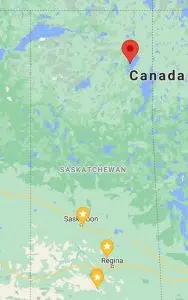As many Saskatchewan communities watch their COVID-19 case numbers drop, the Hatchet Lake Dene Nation — including Wollaston Lake — is dealing with a fast-moving outbreak.
The outbreak was declared June 28. Before that, there were fewer than 10 COVID-19 cases in the community, but as of Monday morning, there were 96 cases associated with the outbreak, according to Dr. Nnamdi Ndubuka, medical health officer with the Northern Inter-Tribal Health Authority (NITHA).
Fourteen of the 96 cases are variants of concern and Ndubuka believes they’ll be confirmed to be the Delta variant first identified in India.
“It’s not surprising really because of the high transmissibility rate of the variants, so this is not surprising because we know that this is how the variants behave,” said Ndubuka.
Ndubuka said at one point the Hatchet Lake community didn’t have any cases.
One person has been sent to hospital in this outbreak, but there haven’t been any deaths.
The outbreak is being blamed on things like private gatherings and people not masking and socially distancing.
“We also do know that individuals are kind of letting their guards down too early,” explained Ndubuka.
There are also low vaccination rates in the community, so fewer people are protected. First-dose uptake in those 12 and up in the area is at 38 per cent, while second doses are at 12 per cent.
Ndubuka said there are several reasons people in the area might not want to be vaccinated, from having had negative experiences with the health-care system in the past to those who are worried about side effects to those who don’t normally take any vaccines whatsoever.
However, Ndubuka said there’s a campaign underway to get more people to take their shots and he thinks it’s starting to make some changes.
Elders and leaders in the community are getting out and encouraging vaccines, according to Ndubuka. Health-care workers are also going door to door to answer questions and encourage people to get a shot.
Ndubuka said they’re also implementing small incentives like a raffle for people who get a shot.
“Discussions are still ongoing in terms of how this will actually be strategized and implemented in the community,” said Ndubuka.
The community is in the far northeast area of the province, but there is a large discrepancy between NITHA’s case numbers and the ones posted by the Ministry of Health on Monday. The ministry’s dashboard shows only 29 cases in the far northeast.
However Ndubuka said it’s just a lag in case reporting because many of the cases were confirmed over the weekend. He explained the ministry relies on NITHA to report cases and it was making plans on Monday for the large number of new cases to be entered into the provincial system.












